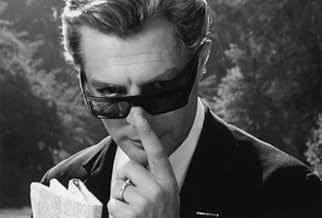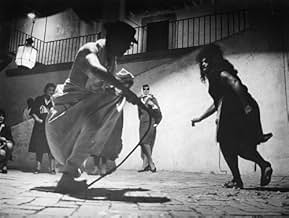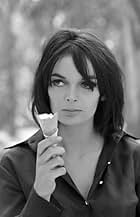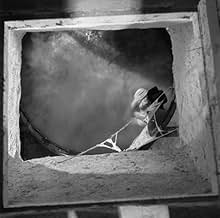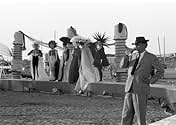Ein bedrängter Filmregisseur flüchtet sich in seine Erinnerungen und Fantasien.Ein bedrängter Filmregisseur flüchtet sich in seine Erinnerungen und Fantasien.Ein bedrängter Filmregisseur flüchtet sich in seine Erinnerungen und Fantasien.
- 2 Oscars gewonnen
- 19 Gewinne & 9 Nominierungen insgesamt
Anouk Aimée
- Luisa Anselmi
- (as Anouk Aimee)
Eddra Gale
- La Saraghina
- (as Edra Gale)
Empfohlene Bewertungen
Intellectuals have written volumes on this strange film by Italian New Wave director, Federico Fellini. I am not an intellectual, so my review will be brief. At its most basic, "8 1/2" (a.k.a. "Otto e mezzo") concerns Guido, a film director (supposedly a surrogate for Fellini himself), who is having what amounts to a midlife crisis. Guido is frustrated in his film-making, and by his relations with other people in his life. But the film's story does not proceed in a traditional, linear fashion. Fellini more or less abandons logical narration, in favor of "open form" narration, wherein the story's causal chain of events is broken.
Thus, trying to figure out what is going on in this film can be hard. Guido's fantasies, memories, dreams, and reality co-mingle in a kind of cinematic stew. Fellini presents viewers with a kaleidoscope of surreal B&W images of ordinary objects and eccentric, chattering characters which interact with Guido and with each other, in ways that defy logic, and give breathtaking meaning to the term symbolism. Followers of psychologist Carl Jung would have a field day. In style, the film is flamboyant. In substance, the film is maddeningly subliminal. And yet, even the most metallic cynic, Pauline Kael notwithstanding, must surely appreciate the rareness of Fellini's probing introspection.
Given the bizarre, unstructured content of "8 1/2", I wonder about the issue of necessity. Suppose Fellini had added an extra ten minutes to the screenplay, or deleted ten minutes. Would that have made any difference? Apart from Guido, if this or that character had been deleted, how would that have changed the story's significance? And if, as some have suggested, the film is a mirror image of Fellini's own confused psyche, can the story be construed as an intuition of his future film-making?
"Otto e mezzo" is not for everyone. Like a Zen koan, "8 1/2" invites frustration. It is above all else a celebration of ambiguity and abstraction, a cinematic experience to ponder, especially on the heels of four or five martinis ... or 8 1/2, if you really want to induce immense intellectual insight. Cheers.
Thus, trying to figure out what is going on in this film can be hard. Guido's fantasies, memories, dreams, and reality co-mingle in a kind of cinematic stew. Fellini presents viewers with a kaleidoscope of surreal B&W images of ordinary objects and eccentric, chattering characters which interact with Guido and with each other, in ways that defy logic, and give breathtaking meaning to the term symbolism. Followers of psychologist Carl Jung would have a field day. In style, the film is flamboyant. In substance, the film is maddeningly subliminal. And yet, even the most metallic cynic, Pauline Kael notwithstanding, must surely appreciate the rareness of Fellini's probing introspection.
Given the bizarre, unstructured content of "8 1/2", I wonder about the issue of necessity. Suppose Fellini had added an extra ten minutes to the screenplay, or deleted ten minutes. Would that have made any difference? Apart from Guido, if this or that character had been deleted, how would that have changed the story's significance? And if, as some have suggested, the film is a mirror image of Fellini's own confused psyche, can the story be construed as an intuition of his future film-making?
"Otto e mezzo" is not for everyone. Like a Zen koan, "8 1/2" invites frustration. It is above all else a celebration of ambiguity and abstraction, a cinematic experience to ponder, especially on the heels of four or five martinis ... or 8 1/2, if you really want to induce immense intellectual insight. Cheers.
After 8 or 9 unsuccessful attempts in the past, at long last I somehow managed to sit through & stay awake for the entirety of this unfathomable bore but at what personal cost. A towering feat of cinematic boredom that arguably has no equals, this avant-garde surrealist comedy-drama turned out to be exactly what I presumed it would be: too far up its own ass.
Co-written & directed by Federico Fellini, the story of 8½ concerns a famous filmmaker who no longer remembers the film he wanted to make. The idea came from Fellini's own creative block during production and through all the pain that he underwent, he decided to make a story that captures the similar frustrations so that the audience can suffer just as much as he did.
On a serious note though, the film does acquaint the viewers to an extent with the struggles of creating art and the personal sacrifices that the process demands. It's an exhibition of what a director's job actually looks like and how regardless of his professional & personal issues, he's expected to deliver. It is aimless & convoluted like the film within the film coz it is the film within the film.
Overall, 8½ is a tedious, overlong & self-indulgent exercise that left me indifferent to everything it had in store and while I see the brilliance of its metafictional construction, the drama remains an insufferable eyesore filled with characters as bland & uninteresting as they can get. And the dream sequences are even worse. In short, this film is nothing more than a mere tick mark on a checklist for me.
Co-written & directed by Federico Fellini, the story of 8½ concerns a famous filmmaker who no longer remembers the film he wanted to make. The idea came from Fellini's own creative block during production and through all the pain that he underwent, he decided to make a story that captures the similar frustrations so that the audience can suffer just as much as he did.
On a serious note though, the film does acquaint the viewers to an extent with the struggles of creating art and the personal sacrifices that the process demands. It's an exhibition of what a director's job actually looks like and how regardless of his professional & personal issues, he's expected to deliver. It is aimless & convoluted like the film within the film coz it is the film within the film.
Overall, 8½ is a tedious, overlong & self-indulgent exercise that left me indifferent to everything it had in store and while I see the brilliance of its metafictional construction, the drama remains an insufferable eyesore filled with characters as bland & uninteresting as they can get. And the dream sequences are even worse. In short, this film is nothing more than a mere tick mark on a checklist for me.
It's been said before: Marcello Mastroianni plays Guido Anselmi, a fictitious, 43-year-old film director with a personal crisis that stunts his creative flow and his inability to get on with his new film after the enormous success of his previous one. The character is iconically brought to life by the immortal Mastroianni with artificially greyed hair and is universally identified as an alter ego of Fellini himself.
The first time I saw 8½ I was in my teens and hated it. I then rewatched it only a few years later, in my early 20s, and something miraculous happened. It was probably a pivotal moment in my film-viewing experience: it suddenly gave me new parametres by which to judge movies and even art in general. I suddenly learnt this new language, so much more beautiful and sophisticated than anything I had heard before. What was most amazing was that after the first negative experience, I had somehow tapped into this language's secret, and it wasn't in the least bit hermetic or difficult, though more complex and sophisticated than other languages I already knew. Many of the movies I'd considered greats became amateurish or dwarfish in comparison.
To me, this was no longer simply a movie, but Art in a more universal sense of the word, Art that just IS and has nothing to strive for or prove. Which is why I find it so nonsensical and contradictory to call something like 8½ "pretentious" - to me, pretentious is when an insecure auteur is trying consciously and hard to be profound, difficult, original, ground-breaking, and you can see their intent clearly, and detect the effort behind the artifice. Nothing of any of this is anywhere to be perceived in 8½, which makes creating masterpieces look easy.
I admit that 8½ is not an easy movie, nor one for everyone. Visually, fewer movies are as iconic, memorable, original, poetic, funny, inventive, allegorical, exhilarating.
The scenes I love are too many to mention, but here are just a few: The steam bath scene when in an odd procession/ritual, the patients are being led into what must be a Turkish bath. All the steam surrounding them, the men wearing sheets that look like shrouds or togas, all looking like mock-ancient Roman dignitaries... Then, through a loud-speaker Mastroianni-Anselmi is told the dried-up, turkey-like Cardinal, will now condescend to meeting him. Before Guido rushes off to meet the Cardinal, all his friends and colleagues beg him to put in a good word for them. This is such a gleeful stab at Italy's grovelling, nepotistic culture of ingratiating oneself to the powers-that-be by paying them lip-service even for the most petty personal advantages. Then Guido stands before the embodiment of Catholic paternalism and his obsequious minions. And everything is at its most pompous and lifeless - this dusty, mummified institution is less in touch with the humanity it's supposed to comfort and advise than it is possible to believe.
I also love the character of Guido's mistress, Carla, played by Sandra Milo at her gaudiest and most voluptuous. Though initially it's difficult to understand what Guido would have seen in her, eventually it become more apparent. Meeting his wife Luisa, you see how well the two women's ways of being complement one another. See for example how she reacts in a simple, good-humoured, self-deprecating way when in the café scene, Guido's elegant, neurotic wife played by Anouk Aimée at her most androgynously attractive - mockingly compliments Carla's tacky outfit for its "elegance". In such instances one gets a sense that though Fellini is parodying his subjects, he also has a fundamental love and human compassion for them.
The prostitute La Saraghina is probably one of the most memorable female characters put to film ever. She is probably somewhere in her 50s and rougher than sandpaper, overweight yet strangely fit and voluptuous, with lots of scary, wild dark hair, overdone raccoon eye make-up caked onto her aggressive, striking, sardonic face as she sits and dances on the lonely beach in Rimini next to her war bunker-home. Guido is fascinated by what is "young and yet ancient", eternal, meaning what is muse-like, archetypically, like the divinely beautiful Claudia character, perfectly embodied by Claudia Cardinale (the ultimate director's muse rather than a real woman or mistress). La Saraghina may not be a young woman like Claudia, she may not represent spontaneity and fresh, uncluttered artistic inspiration like she does, but she is also a muse of sorts - the muse of guilt-free pleasure and non-self-conscious, free, unidealised, earthy femininity. All this is La Saraghina - the town's young boys respond to this in her (including Guido as a child) and are bewitched by her and pay to her to see her demonic yet liberating, visceral dance.
I have so much more to say about this movie, for instance about Nino Rota's memorable score, or how the movie's non-linear structure and juxtaposition of seemingly unrelated scenes emulates the rhythm and mood of dreams to perfection. Also, the scenes featuring Guido's parents and their embodiment of the emotional blackmail, that eternal sense of guilt and the stunting of individuality that the paternalistic institution of family at its most traditional represents in Italy. Or of Guido's touching childhood memories, of the wonderful way in which the movie ends, in a merry-go-round of what really matters in life, when all else has been swiped aside and all that remains is the desire to cherish (with all their imperfections) all those who have really mattered most in our lives...
The first time I saw 8½ I was in my teens and hated it. I then rewatched it only a few years later, in my early 20s, and something miraculous happened. It was probably a pivotal moment in my film-viewing experience: it suddenly gave me new parametres by which to judge movies and even art in general. I suddenly learnt this new language, so much more beautiful and sophisticated than anything I had heard before. What was most amazing was that after the first negative experience, I had somehow tapped into this language's secret, and it wasn't in the least bit hermetic or difficult, though more complex and sophisticated than other languages I already knew. Many of the movies I'd considered greats became amateurish or dwarfish in comparison.
To me, this was no longer simply a movie, but Art in a more universal sense of the word, Art that just IS and has nothing to strive for or prove. Which is why I find it so nonsensical and contradictory to call something like 8½ "pretentious" - to me, pretentious is when an insecure auteur is trying consciously and hard to be profound, difficult, original, ground-breaking, and you can see their intent clearly, and detect the effort behind the artifice. Nothing of any of this is anywhere to be perceived in 8½, which makes creating masterpieces look easy.
I admit that 8½ is not an easy movie, nor one for everyone. Visually, fewer movies are as iconic, memorable, original, poetic, funny, inventive, allegorical, exhilarating.
The scenes I love are too many to mention, but here are just a few: The steam bath scene when in an odd procession/ritual, the patients are being led into what must be a Turkish bath. All the steam surrounding them, the men wearing sheets that look like shrouds or togas, all looking like mock-ancient Roman dignitaries... Then, through a loud-speaker Mastroianni-Anselmi is told the dried-up, turkey-like Cardinal, will now condescend to meeting him. Before Guido rushes off to meet the Cardinal, all his friends and colleagues beg him to put in a good word for them. This is such a gleeful stab at Italy's grovelling, nepotistic culture of ingratiating oneself to the powers-that-be by paying them lip-service even for the most petty personal advantages. Then Guido stands before the embodiment of Catholic paternalism and his obsequious minions. And everything is at its most pompous and lifeless - this dusty, mummified institution is less in touch with the humanity it's supposed to comfort and advise than it is possible to believe.
I also love the character of Guido's mistress, Carla, played by Sandra Milo at her gaudiest and most voluptuous. Though initially it's difficult to understand what Guido would have seen in her, eventually it become more apparent. Meeting his wife Luisa, you see how well the two women's ways of being complement one another. See for example how she reacts in a simple, good-humoured, self-deprecating way when in the café scene, Guido's elegant, neurotic wife played by Anouk Aimée at her most androgynously attractive - mockingly compliments Carla's tacky outfit for its "elegance". In such instances one gets a sense that though Fellini is parodying his subjects, he also has a fundamental love and human compassion for them.
The prostitute La Saraghina is probably one of the most memorable female characters put to film ever. She is probably somewhere in her 50s and rougher than sandpaper, overweight yet strangely fit and voluptuous, with lots of scary, wild dark hair, overdone raccoon eye make-up caked onto her aggressive, striking, sardonic face as she sits and dances on the lonely beach in Rimini next to her war bunker-home. Guido is fascinated by what is "young and yet ancient", eternal, meaning what is muse-like, archetypically, like the divinely beautiful Claudia character, perfectly embodied by Claudia Cardinale (the ultimate director's muse rather than a real woman or mistress). La Saraghina may not be a young woman like Claudia, she may not represent spontaneity and fresh, uncluttered artistic inspiration like she does, but she is also a muse of sorts - the muse of guilt-free pleasure and non-self-conscious, free, unidealised, earthy femininity. All this is La Saraghina - the town's young boys respond to this in her (including Guido as a child) and are bewitched by her and pay to her to see her demonic yet liberating, visceral dance.
I have so much more to say about this movie, for instance about Nino Rota's memorable score, or how the movie's non-linear structure and juxtaposition of seemingly unrelated scenes emulates the rhythm and mood of dreams to perfection. Also, the scenes featuring Guido's parents and their embodiment of the emotional blackmail, that eternal sense of guilt and the stunting of individuality that the paternalistic institution of family at its most traditional represents in Italy. Or of Guido's touching childhood memories, of the wonderful way in which the movie ends, in a merry-go-round of what really matters in life, when all else has been swiped aside and all that remains is the desire to cherish (with all their imperfections) all those who have really mattered most in our lives...
Fellini's 8 1/2 opens with a stunning dream sequence in which a man is trapped in his car in the middle of a traffic jam. The doors and windows are locked and there is no escape. Other drivers simply sit and stare at him passively. The driver starts to panic as smoke begins to build up within the car. Propelling himself outside a window, he floats over the other cars and soars above the world until he is pulled down a rope attached to a tether on his ankle. The driver is Guido Anselmi (Marcello Mastroianni), a film director at odds with himself. Shot in black and white, 8 1/2 is an exhilarating, confusing, irritating, and inspired journey into a man's consciousness. It is not just a look at the inner turmoil of one person, but also a commentary on each person's struggle to make sense of their life. The film's combination of kaleidoscopic images, evocative score by Nino Rota, and amazing performances ensure its place as one of the greatest films of the century.
Guido is preparing to shoot a new film with an expensive budget. He constructs a huge spaceship launch pad that costs $80 million but he is unsure of what he wants to say. Guido's dishonesty in dealing with his marriage, his career, and the fact that he really does not want to make the film forces him to falsely mislead people as to his true intentions. He feels like a failure and is physically spent. He checks into a spa to restore his health and well being but the contingent of producers, actors, writers, and hangers on undermine his strength. His feeling of being overwhelmed by personal and professional obligations provides the catalyst for dreams and fantasies that take him back to his childhood.
Fellini shows his encounter with the prostitute Saraghina (Eddra Gale) and the guilt he has to deal with in a confrontation with the Catholic Church. Guido invites his intellectual wife Luisa (Anouk Aimée) to the set but their relationship has turned cold and passionless, and sparks fly when she has to confront Carla (Sandra Milo), his buxom mistress. Guido is misguided but he has an innocence and charm that allows us to overlook his indulgences. He enjoys his pleasures but has a conscience and feels guilty about cheating on Luisa whom he loves and is afraid of losing. He fantasizes that all of the women in his life are together in a harem where they all dote on his every whim. When they finally recognize how little he cares about them, he is forced to suppress their revolt.
As image piles on image and the fantasy becomes indistinguishable from the reality, the viewer may get lost in a maze of dazzling incoherence. Fellini, however, always returns to solid ground and the film offers not only a satire on the frenzy, the uncertainty, and the clash of egos involved with making a film but also a serious commentary on the importance of honesty in a relationship. If 8 1/2 is occasionally exhausting, the ending is invigorating, letting us know that life is a game in which each of us is on the stage performing our roles and the only sane response to its turmoil is to join hands in love and celebrate the moment.
Guido is preparing to shoot a new film with an expensive budget. He constructs a huge spaceship launch pad that costs $80 million but he is unsure of what he wants to say. Guido's dishonesty in dealing with his marriage, his career, and the fact that he really does not want to make the film forces him to falsely mislead people as to his true intentions. He feels like a failure and is physically spent. He checks into a spa to restore his health and well being but the contingent of producers, actors, writers, and hangers on undermine his strength. His feeling of being overwhelmed by personal and professional obligations provides the catalyst for dreams and fantasies that take him back to his childhood.
Fellini shows his encounter with the prostitute Saraghina (Eddra Gale) and the guilt he has to deal with in a confrontation with the Catholic Church. Guido invites his intellectual wife Luisa (Anouk Aimée) to the set but their relationship has turned cold and passionless, and sparks fly when she has to confront Carla (Sandra Milo), his buxom mistress. Guido is misguided but he has an innocence and charm that allows us to overlook his indulgences. He enjoys his pleasures but has a conscience and feels guilty about cheating on Luisa whom he loves and is afraid of losing. He fantasizes that all of the women in his life are together in a harem where they all dote on his every whim. When they finally recognize how little he cares about them, he is forced to suppress their revolt.
As image piles on image and the fantasy becomes indistinguishable from the reality, the viewer may get lost in a maze of dazzling incoherence. Fellini, however, always returns to solid ground and the film offers not only a satire on the frenzy, the uncertainty, and the clash of egos involved with making a film but also a serious commentary on the importance of honesty in a relationship. If 8 1/2 is occasionally exhausting, the ending is invigorating, letting us know that life is a game in which each of us is on the stage performing our roles and the only sane response to its turmoil is to join hands in love and celebrate the moment.
I know this film is loved and admired by countless filmmakers and fans. I know that the film is very artistic and wonderfully well made. And I understand that all serious lovers of film SHOULD see this film. But, despite this being a "must-see" film, I didn't particularly enjoy it--but I do respect what Fellini was trying to do. For the first time, Fellini was able to capture on film the psyche and inner turmoil of a director and although the film stars Marcello Mastroianni, the film is in many, many ways autobiographical. His inner struggles with traditional morality and god, sexuality and loyalty, all the sycophants trying to get his attention and the critic as well as his own childhood (including, of course his mother AND a representation of early sexual awakening in the form of a hideous but very sexual lady who looked a lot like Divine!) all come together in a series of somewhat disconnected images. All these factors that together work together to make the director's psyche are interesting, but very surreal--like the entire film is a dream or something that is the result of drugs. It is interesting at times, but also very tiring and difficult to watch at times and occasionally a bit dull. That's because it's a very choppy movie and only a child who is very hyperactive could easily stick with the ever-changing plot. As for me, what I liked best was the opening dream sequence--it was very amusing and brilliant.
This type of self-analysis and parody was often copied in such films as STARDUST MEMORIES (to me, a blatant attempt by Woody Allen to steal or re-created 8 1/2) or DAY FOR NIGHT--though Truffaut's vision is much, much more conventional and lacks the surrealism and weirdness of Fellini. Many prefer Fellini's mad style, but as for me, while it is not as original or wildly innovative, DAY FOR NIGHT was a more enjoyable film.
Overall, while not a fun or completely comprehensible film, it's a must for anyone who considers themselves a serious fan of film.
This type of self-analysis and parody was often copied in such films as STARDUST MEMORIES (to me, a blatant attempt by Woody Allen to steal or re-created 8 1/2) or DAY FOR NIGHT--though Truffaut's vision is much, much more conventional and lacks the surrealism and weirdness of Fellini. Many prefer Fellini's mad style, but as for me, while it is not as original or wildly innovative, DAY FOR NIGHT was a more enjoyable film.
Overall, while not a fun or completely comprehensible film, it's a must for anyone who considers themselves a serious fan of film.
Wusstest du schon
- WissenswertesAchteinhalb (1963) was shot, like almost all Italian movies at the time, completely without sound recording on set. All dialogue was dubbed during post production. Federico Fellini was known for shouting direction at his actors during shooting, and for rewriting dialogue afterwards, making a lot of the dialogue in the movie appear out-of-sync. (Source: High-def Digest)
- PatzerWhen Guido visits the cardinal in the mud bath, the cardinal is sitting in a chair, fully dressed in his cassock, as two attendants use a sheet to form a curtain around him; however, as the camera cuts to a closer angle, the cardinal is suddenly undressed to the waist.
- Zitate
Claudia: I don't understand. He meets a girl that can give him a new life and he pushes her away?
Guido: Because he no longer believes in it.
Claudia: Because he doesn't know how to love.
Guido: Because it isn't true that a woman can change a man.
Claudia: Because he doesn't know how to love.
Guido: And above all because I don't feel like telling another pile of lies.
Claudia: Because he doesn't know how to love.
- Alternative VersionenIn the American theatrical release version, Rodgers & Hart's "Blue Moon" can be heard twice: the first time, when it's played by strolling strings near the shopping plaza where Guido meets up with his wife, Luisa; the second time, when Guido goes out for a drive with the "real" Claudia. However, in the original Italian release, the song played in both scenes is "Sheik of Araby." The Criterion laserdisc features "Blue Moon," but it's "Sheik of Araby" on the DVD, possibly due to the use of different source materials.
- VerbindungenEdited into Bellissimo: Immagini del cinema italiano (1985)
Top-Auswahl
Melde dich zum Bewerten an und greife auf die Watchlist für personalisierte Empfehlungen zu.
Details
Box Office
- Bruttoertrag in den USA und Kanada
- 245.681 $
- Eröffnungswochenende in den USA und in Kanada
- 11.947 $
- 11. Apr. 1999
- Weltweiter Bruttoertrag
- 347.423 $
- Laufzeit
- 2 Std. 18 Min.(138 min)
- Farbe
- Sound-Mix
- Seitenverhältnis
- 1.85 : 1
Zu dieser Seite beitragen
Bearbeitung vorschlagen oder fehlenden Inhalt hinzufügen





